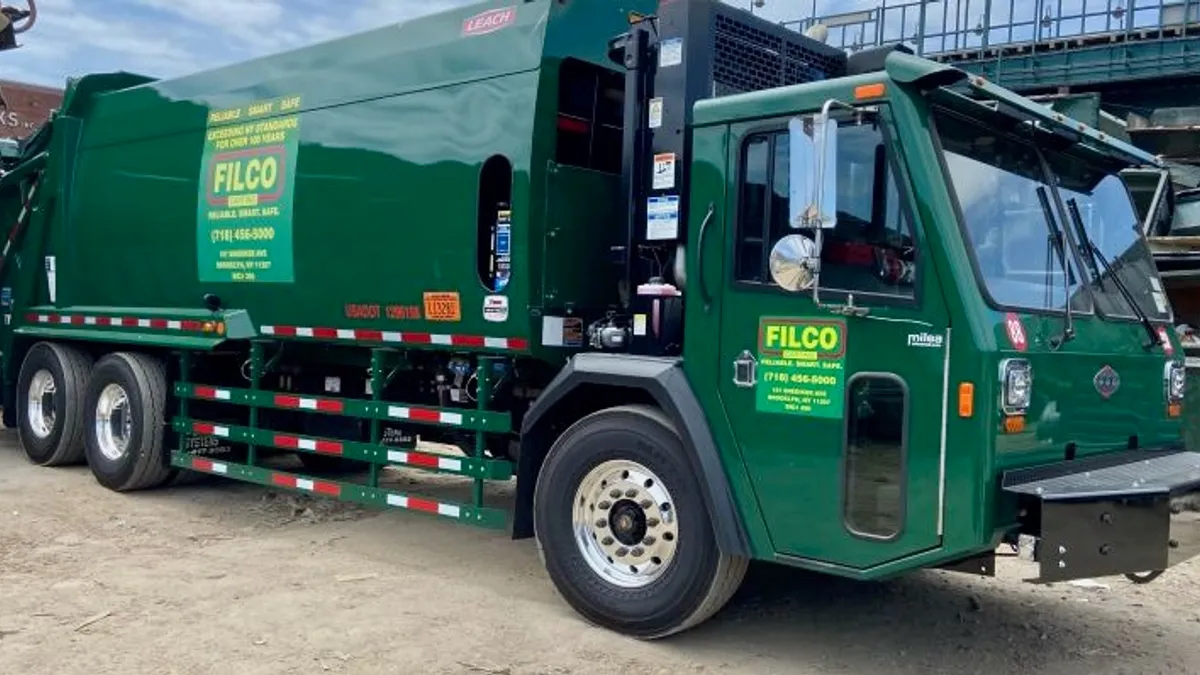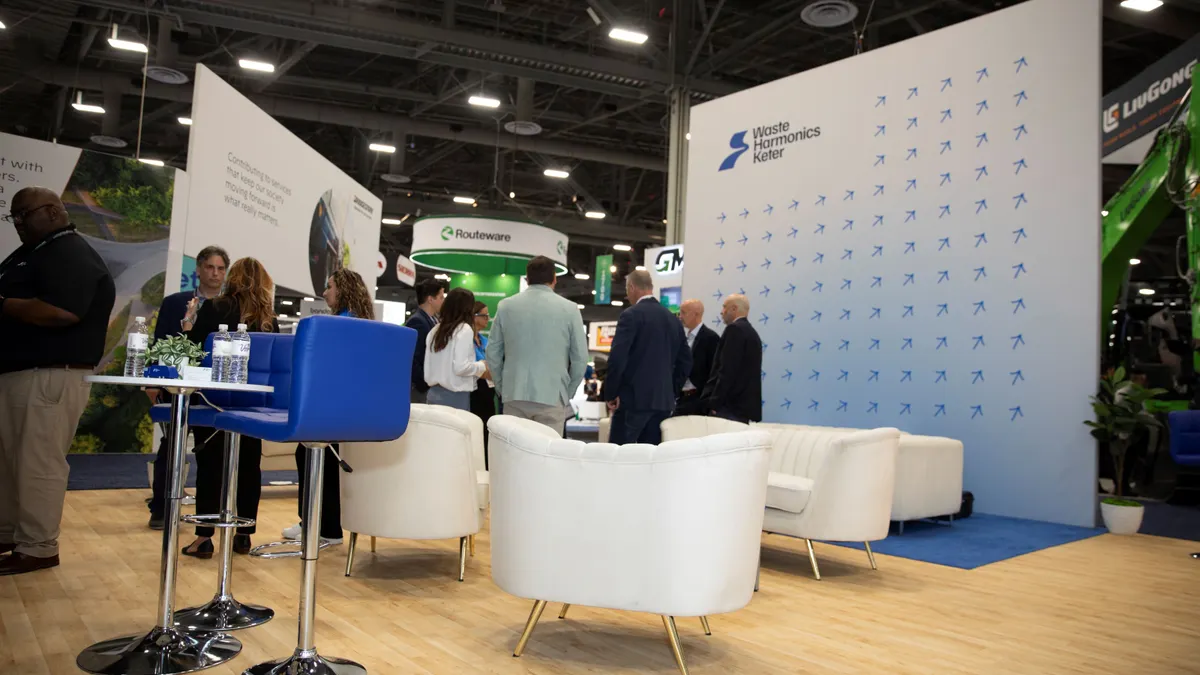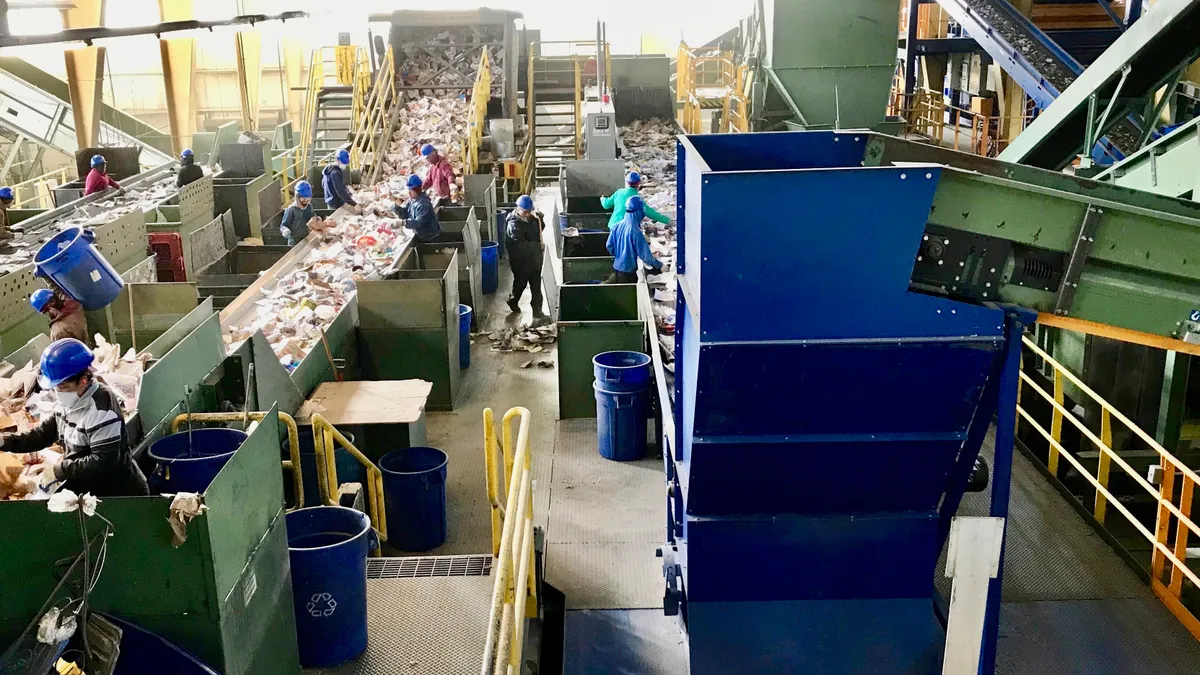Jim Fish has had a busy six months since taking the helm at Waste Management.
Between rethinking its recycling approach and restructuring recycling contracts, Waste Management has been showing some of its strongest growth in years. The recent wins of a 10-year franchise collection contract in Los Angeles and a 20-year export contract in New York have added to that momentum. Like others in the industry, Waste Management is also expanding its fleet of compressed natural gas (CNG) vehicles and looking at new ways to utilize technology on the road.
All of this comes at a time when cities are looking for new ways to move away from using landfills, while setting high diversion rate goals that may not correlate with commodity realities. Waste Dive caught up with Fish, the president and CEO of Waste Management, in New Orleans this week to hear the latest on where the industry's biggest player is heading next.
The following transcript has been edited for brevity and clarity.
WASTE DIVE: You recently mentioned plans to hire a CTO (chief technology officer) and to my knowledge no other large company in the industry has one. What made you decide it was time?
JIM FISH: Well I think technology dictates it to some degree. We've put technology into place to the tune of between $100 to $150 million a year over the last five years. While we have vice presidents within our technology group, putting somebody on the job — one person on the job as opposed to two — and somebody that's thinking about the use of data [is important.] How do we take those onboard computers that we have now on every truck and ultimately turn that into a tool to further the differentiation between us and others? It seems to me kind of obvious because so many companies are doing it, but maybe not quite as obvious in our industry. But look, it's going to come. It's already coming. You see other companies putting technology to use and we are hoping to take a leadership role there.
What will the ideal candidate look like? Would you prefer somebody from within the industry or someone from outside who could bring a new perspective?
FISH: Somebody that has an understanding of our business is important. We'll certainly look externally and we'll look internally ... and we do that with just about every job. It is helpful to have somebody that has some understanding of routing and logistics businesses. So I think that candidate will look like somebody that understands technology, not necessarily somebody that knows how to write code. Somebody that can understand where the future is. We have a huge amount of data. How do we use it best? What type of customer solution do we present to our customers?
About 44% of Waste Management's fleet is now CNG. What is the high end of that number? Could it ever reach 100%?
FISH: Ideally, long-term it could be 100%. What keeps you from getting to 100% in the near term is that we've pretty much put it into our big sites. And when you put CNG into your big sites you have to retrofit your maintenance facility and you have to put in individual fueling stations. That works fine in Oakland, CA where we may have 250 or 300 trucks. But in a small location in eastern Kentucky where you have 10 routes, you don't get the economies of scale. Because it's not that much less expensive to retrofit your maintenance facility ... and putting in the compressor station and all of that on a 10 route site is also challenging. So looking at mobile fueling solutions and having something that's economically viable, I think that's the next step required in order for us to go all the way to 100%.
Last year, Waste Management announced it would begin measuring recycling activity by the amount of greenhouse gas emissions reduced rather than tonnage diverted. How are municipalities responding so far? Are you getting any pushback?
FISH: I think they're responding well, but there's still more work to be done. If you look at an 8-yard container of cardboard versus an 8-yard container of glass, glass is heavier. Therefore a municipality that has weight-based goals would be inclined to say, "If we had to choose between the two let's pick the container of glass." When in fact the purpose of recycling is to improve the environment. If you look at those two from an environmental standpoint clearly the recycling of the container of cardboard is better for the environment than the container of glass. The shortage of raw material is on the cardboard side because it comes from trees versus glass which comes from sand.
So I think our objective is to try and communicate that to these municipalities, to let them know, "Look, the objective should be to recycle more not to divert more." They tend to think of diversion in weight basis.
Is part of that making the economic case to them as well?
FISH: Yeah for sure. When we look at our profitability by commodity type, cardboard ends up being more profitable than glass for us. And it goes back to the fact that the raw material is very cheap for producing a glass bottle versus cardboard. Cardboard fluctuates a bit, but companies would prefer to use recycled cardboard because it is less expensive than virgin cardboard. Not necessarily the case with glass.
How does that apply to your new contract in LA? The city has set strict financial penalties for not achieving certain diversion targets and that scared some companies away during the contract negotiations. Doesn't that run counter to your new approach in a way?
FISH: Look, I think it's a differentiator for us. We have a brand new facility there in Azusa. It might sound odd, but we like when we're held to a higher standard. We just want to make sure that everybody's held to the same standard. So with the city of LA contract, the fact that it may have scared folks away that simply couldn't comply with that ends up being a benefit for us.
"It might sound odd, but we like when we're held to a higher standard."

Jim Fish
President & CEO, Waste Management
How is the transition going? It looks complex, a lot of route swapping is involved and new equipment is needed.
FISH: It's going well. All the containers and the trucks have been ordered. So we'll start taking delivery of those pretty soon. We've been working through the IT side of this with the city because we have to have connectivity between the city and our systems. We're working on the transition plan with the city so we'll be ready for July 1. It is a big transition, a complex transition, but I have no doubt that we'll be ready for it.
During recent interviews, you've mentioned investing in landfill alternatives. What does that look like? Are we talking new conversion technologies?
FISH: It takes a number of different forms. We've spent over $500 million, probably closer to $600 million, looking for that next generation of landfills. There's a natural end of life for every single landfill. No landfill lasts forever. You have a couple of options with landfills. There's a lot of land in the U.S. and Canada, so you can build farther out. Or maybe we build closer in, but with an alternative technology.
It's got to be both environmentally and economically sustainable. Some of these technologies simply aren't scalable. Some of them don't work to begin with. Scalability is a big hurdle. It may work in a small laboratory setting, but it doesn't work on a bigger scale. Then it has to clear the economics hurdle. So far we've had a tough time getting them to clear that hurdle because landfills are very cost-effective. So being cost-competitive with a landfill is tough.
We're in an R&D stage right now with it. We've [invested in] a limited partnership with some venture capitalists, who have PhDs on their staffs and they're out combing the world, looking for those technologies.
"We've spent over $500 million, probably closer to $600 million, looking for that next generation of landfills."

Jim Fish
President & CEO, Waste Management
Is there anything in particular you're looking at? I know pyrolysis was one of the options that Waste Management had been exploring in the past.
FISH: There's a couple of intriguing technologies. We're looking at one called SpecFUEL that we've invested in out in Philadelphia. It creates almost a coal substitute. We're still working through whether we can make it capital and operating cost efficient, but it is scalable. We've got to look and see whether the customer can receive it. So if it's a big cement kiln or if it's a public utility, can they burn SpecFUEL in their boilers? We think they can. I'm not going to say we're ready to convert from landfill to SpecFUEL tomorrow, but that one has some promise to it. There's a number of them that look interesting to us, but nothing that's been able to clear those three hurdles yet.
Are regional costs helping drive where you focus on these technologies?
FISH: Correct. It makes a big difference if your tip fee is $60 versus $15 and that helps the economics a lot. So as you see these things pop up it's not coincidence that our SpecFUEL [facility] is in Philadelphia. Or we've got some other technologies that are in other parts of the country, or in Canada, where disposal rates are higher. You're not going to see these pop up in areas that have $15 tip fees, yet. We'll figure it out first in Boston where we may have $60 tip fees or Philadelphia before we figure it out in an area that has $15 or $20 tip fees.
What is on your radar for the rest of the year in terms of industry or economic trends?
FISH: The economy is certainly on top of mind right now for me. Today there were some good manufacturing numbers that came out and job hiring within the manufacturing sector was up for the fifth straight month. Right now most CEOs are focused on the economy. Can this administration establish enough consensus — between honestly within its own party, but also within Democrats and Republicans — to come up with something that's productive for the U.S. economy? And rationalizes the corporate tax structure so that people aren't storing money overseas? Bring it back home. If the administration can do that then it'll be a big success for not just our industry, but all companies within the U.S. and Canada.
Stay tuned for more from Fish in an upcoming episode of Waste Dive's Talkin' Trash podcast and additional interviews with other industry CEOs from WasteExpo this week.

















